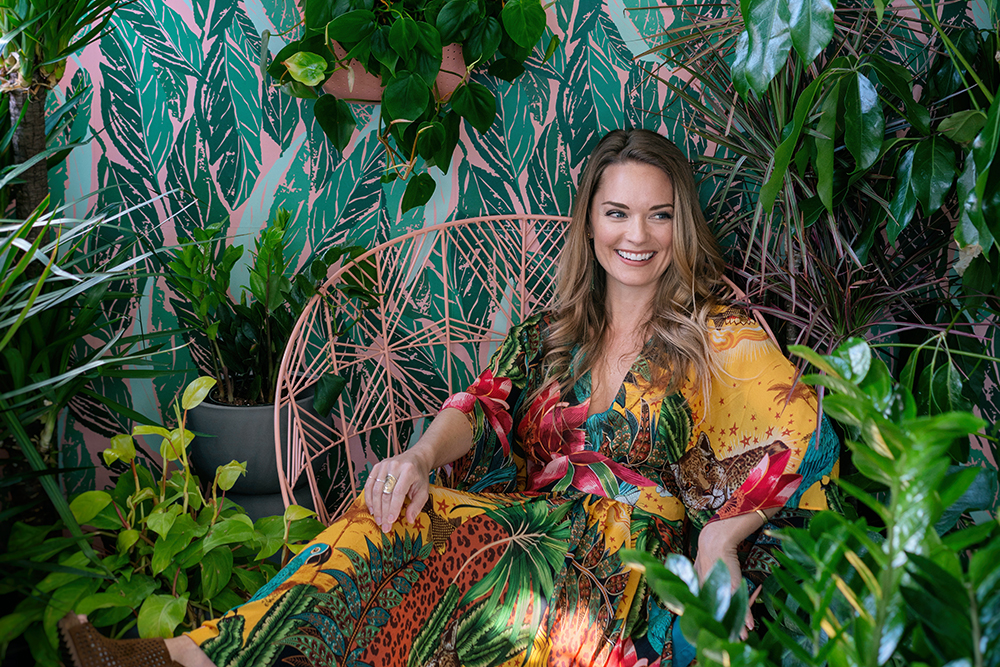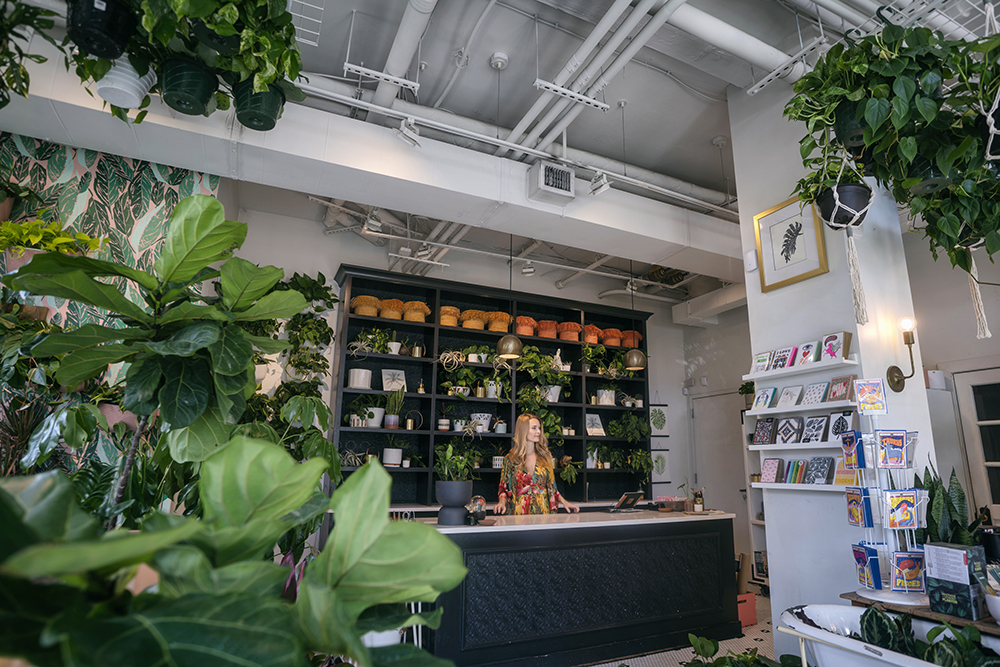Life
 Amanda McClements. Photos by Cassidy DuHon.
Amanda McClements. Photos by Cassidy DuHon.
Plants, The Powerful Connector: Little Leaf Owner Amanda McClements on Community, Connection + Indoor Jungles
April 10, 2020 @ 10:00am
“I totally lit a cactus on fire.”
I’m on the phone with Amanda McClements, a notable presence in D.C.’s small business community and founder of lifestyle boutiques Salt & Sundry and Little Leaf, as she readily opens up about this green thumb snafu.
“I stuck an incense stick down in the soil and when I lit the incense, the cactus just went up in flames because it was so dry,” she tells me with a chuckle. “It just torched.”
This story has a happy ending though, as she assures me the cactus is alive and thriving.
“The lesson is do not stick incense in your plant soil or burn your Sydney Hale candle beside your air plant.”
McClements is now referring to my own whoops moment, when I managed to kill the most low-maintenance plant possible by lighting a candle too close to it. Hours later, my plant pet was burnt to a crisp. My reason for mentioning this to her is twofold: a locally made Sydney Hale candle was my first Salt & Sundry purchase years ago, and I wanted to come clean about my complete and utter lack of ability to keep a plant alive. But what felt like an admission of guilt – my mom has never let me live down the air plant incident – was met with an “it happens to all of us” mentality.
“People think they have a green thumb or they don’t, and that’s not true,” she says. “I kill plants. My managers kill plants. It’s really just about the confidence and the commitment. I have probably 20 or 30 plants at home. I kill my fair share. Luckily, I have a shop full of plants to replenish them when I need to.”
Little Leaf, Salt & Sundry’s little sister shop and self-described tiny jungle in Logan Circle, opened in December 2016 to serve two different communities.
“We’re serving the first-time plant parent who just wants something that’s going to be low-maintenance they can take care of, and then we’re serving the really passionate plant collectors who want the rare, the interesting, the hard to find.”
McClements relies on her team of enthusiasts to keep their finger on the pulse about what collectors are interested in and stays in constant communication with her growers to get the scoop on what’s available. Instagram has been an extremely effective tool for the shop, where she and her team can post plant enthusiast eye candy as soon as it’s ready for sale.
“We can get our hands on something like a batch of string-of-pearls and post that on Instagram, and we’ll have a waitlist of 30 people by the end of the day who are going to run to the shop and grab one because they’ve been waiting to add that to their collection.”
She says Little Leaf is designed to set people up for success, a gentle nudge to get comfortable owning and caring for plants.
“Don’t be so intimidated,” she urges. “You’ve got this. Once you have some confidence with one type of plant, you can start branching out, and then it becomes a really fun way to collect things in your home.”

While everything green, from terrarium-making workshops to succulent collections, has seen an uptick in popularity in the District over the past few years, McClements assures me that plants aren’t a trend.
“What we’re really seeing is a correction from a time when people weren’t paying that much attention to plants. Back in the ‘60s and ‘70s, people had really lush jungles in their apartments and that was chic then. I like to think of it as we’re in a correction back to plants being a necessary part of creating a beautiful environment in your home.”
She recalls her plant-filled childhood, and one night in particular when she was kicking her legs back and forth on the floor while doing her homework and stuck her foot firmly into a giant cactus. She laughs as she tells me about all of the cactus prickles in her foot, and it’s evident that her deep love of plants goes back to her formative years.
“My mom was a total hippie. I was born in the 70s and we always had a huge jungle inside the house as well as outside. My parents were huge gardeners and grew a lot of food. I have such fond memories.”
On a more macro level, she says plants are a really powerful connector.
“I think that’s why you’re seeing people rally around that in communities. You can get a small plant for a couple of dollars, and as you gain confidence and have success, you’re rewarded with these little victories. It becomes this addictive hobby that connects you to all of the other people who are also obsessed.”
The resounding sense of community around this accessible hobby is a huge draw for those of us struggling to stay sane through social isolation amid Covid-19. But plants check some other important boxes during self-quarantine, too: the ability to control our environment, beautify our surroundings, care for a living thing and support our local businesses.
When I pick McClements’ brain about pro tips for those of us looking to start, or grow, our plant collections, she is quick to tell me that a lot of plants can get by on very little – in other words, don’t love your plants to death. Avoid overwatering them or putting them into bright sun too soon. Be patient.
“One of my favorite pieces of advice, which is probably more important now than ever because we’re all sitting here staring at our plants all day long, is that a little neglect goes a long way. If you’re somebody who tends to want to mess too much, let them be. Water them less frequently than you might think. A lot of the plant deaths we see have more to do with over-loving your plant than under-loving your plant. And then of course, there are people on the other end of the spectrum who want plants they can neglect. We sell a lot of plants that only need to be watered once or twice a month.”
Her pick for an easy and rewarding plant to bring home? The heartleaf philodendron. I spotted many of these beauties in her shop during our cover shoot hanging from the walls with long, elegant tendrils trailing down.
“They’re very common. They’re easy to find. But I just love them because they’re beautiful. They’re really good communicators. They tell you what they need. When they need water, you can tell from their leaves.”
She also recommends propagation as an engaging activity: you snip stems from an existing plant, put them in water and let them grow roots. Little Leaf even has a propagation wall that says, “Rooting for you,” which McClements says feels very appropriate right now. The shop invites locals to come in and trade the team for something they’re propagating at home or grab one of Little Leaf’s stems or vines for a nominal fee and take it home to continue the process. While the shop is currently closed due to the pandemic, purchases can be made online at www.littleleafshop.com.
She’s also in the process of rolling out delivery options for Little Leaf and exploring market partners, both of which should be announced by early April, to support D.C.’s stay-at-home guidelines. On April 9, she’ll make her first plant drop to Coconut Club’s community market, where a variety of plants will be available for sale.
“We want people making as few trips from home as possible, so we’re encouraging folks to stock up on essentials at the market when they head over for a plant.”
Salt & Sundry is following suit, shipping out orders as fast as possible and completing some local deliveries when requested.
As a fixture in the local community – the UNC-Chapel Hill grad has lived in the District since 2001 and in Logan Circle for 15 years – McClements is a voice for many small business owners navigating the tumultuous waters of the coronavirus. Salt & Sundry’s flagship location in Union Market opened in 2012, and in those eight years, she says it’s been really fun to watch the forward momentum of D.C.’s creative scene. She clearly feels a deep connection to her peers, so much so that she started a group chat on Slack with other restaurant owners and retailers as an information exchange and source of comfort.
“I’ve always been an open book and I think a lot of business owners feel the same,” she says. “It’s really encouraging and heartening to have a group of people you can swap ideas and trade resources with, and where every time the mayor announces legislation or the federal government passes a relief package, we’re all messaging back and forth about what that means and how we can take advantage of the programs to help us pull through and survive.”
Her passion for the community extends to helping those in need. Aria Development Group recently purchased 75 plants from Little Leaf, which will be delivered to George Washington University Hospital on April 8 as thank you gifts for the staff’s tireless efforts.
“They’re supporting a small business (us!) and giving the hardworking frontline folks a bit of cheer. We are super pumped.”
And as for her own mental health needs, beyond the occasional cactus fire and adding to her collection of stunning plants, she’s taking virtual Barre3 classes.
“I love the community there and it’s a good way to move our bodies as we’re all cramped on our computers trying to save our businesses.”
Her other sanity-saving activities include frequent takeout orders with ample libations, an important driver for local restaurants, and getting out for walks whenever she can within healthy social distancing guidelines.
While she’s hunkered down in survival mode practicing self-care and doing everything she can to protect her work family, McClements is also lifting her head up to see what and how everyone else is doing. She implores our community to use social media, Instagram especially, to help businesses like hers survive.
“Follow your favorite local businesses, restaurants, clubs, yoga studios. We’re all pivoting to that medium to try to get through this. Social media is the game now for us all, so follow. Follow everyone.”
Shop online at www.littleleafshop.com and follow Little Leaf on Instagram @littleleafshop. Check out Coconut Club’s market at 540 Penn St. in NE, DC on Wednesday through Friday from 3-7 p.m. to snag a plant in person.
For more on the Power of Plants, check out more tips and tricks here.







